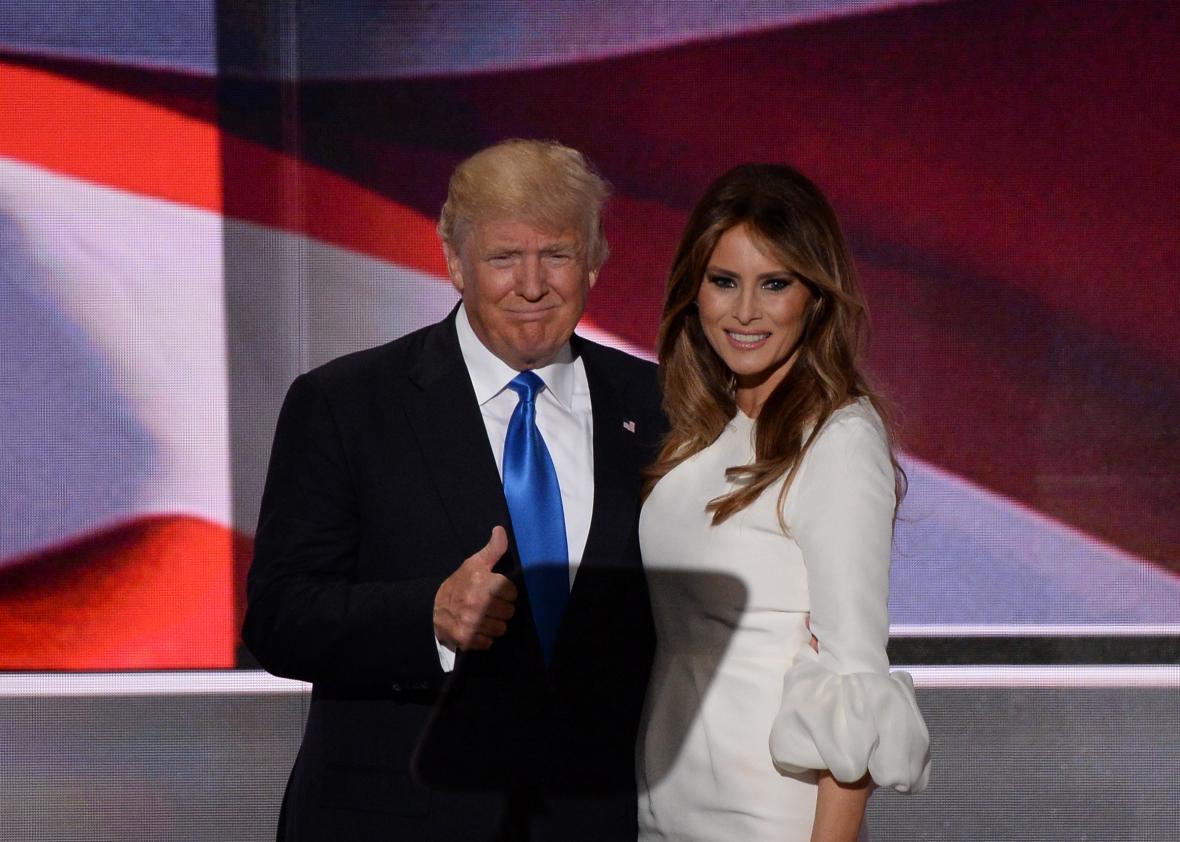In 1992, Pat Buchanan gave a speech at the Republican National Convention that became instantly notorious for its paranoid racism, crescendoing in an ugly evocation of the Los Angeles riots. Donald Trump’s dark and distorted keynote Thursday night was in many ways a re-upping of Buchanan’s noxious vision. But Buchanan’s speech, directed squarely at Christian conservatives, was also memorable for its articulation of the culture wars: He blasted Hillary Clinton’s “radical feminism” and warned that “Clinton and Clinton” would impose an agenda consisting of “abortion on demand” and “homosexual rights.” By contrast, this week’s Republican convention in Cleveland barely tried to pretend that its candidate cares about abortion, sexuality, or God.
Trump’s slog of an acceptance speech “focused”—if you can call it that—on his pet topics of immigration, crime, and trade. He has shied away from social issues on the campaign trail, and for good reason. This is a lifelong New Yorker who has previously claimed to be “very pro-choice” and who enraged both the pro-life and pro-choice communities in March when he blundered into saying that women should be punished for getting abortions. True to form, his convention speech side-stepped the issue of abortion completely.
Social conservatives noticed, and they were not happy.
On LGBTQ issues, Trump sounded typically tone-deaf last night, but he was at least shouting incoherently in the right direction. He mentioned the June 12 shooting at the Pulse nightclub in Orlando, and vowed: “As your president, I will do everything in my power to protect our LGBTQ citizens from the violence and oppression of a hateful foreign ideology. Believe me!” The crowd roared with approval, and Trump went on: “I have to say, as a Republican, it is so nice to hear you cheering for what I just said. Thank you.”
Other speakers throughout the week seemed unwilling to even pretend that Trump cares about the traditional rallying cries of the culture wars. RNC chair Reince Priebus said “He’s going to protect the lives of the unborn,” and Liberty University President Jerry Falwell Jr. offered an assurance that Trump will appoint “conservative pro-life justices to the Supreme Court.” Mike Pence, Trump’s vice-presidential pick, who was presumably chosen as an emissary to the evangelical community, made only a passing reference to “the sanctity of life.” Even Tony Perkins, the president of the Family Research Council, spent most of his Thursday night speech sermonizing on the words “under God” in the Pledge of Allegiance and how Trump will uphold “our ability as citizens to unite again as one nation under God.” Various other Christian speakers paid passing tributes to their own faiths, but few wasted time trying to claim that Trump is devout.
The motley crew of prominent Christians that Trump has managed to woo to his side are not the compassionate, intellectual, or morally subtle types. They are craven prosperity gospel proponents and opportunistic self-promoters. If they thought it would benefit them—never mind Trump—to toss red meat on tradition social issues to their audience, they would do it.
The optimistic read on the convention’s relative godlessness is that it reflects an evolution in how Republicans in general, and conservative Christians in particular, view these old culture-war chestnuts. There’s some evidence for that evolution, especially regarding sexuality and gender. The crowd in Cleveland cheered when PayPal co-founder Peter Thiel said he was “proud to be gay” in a speech that dismissed the issue of transgender bathroom access as a “distraction.” That’s an argument that has plenty of serious problems, but it’s better than whipping up anti-trans fervor.
The convention’s quietness on abortion is a stickier question. Right now there is serious legislative and cultural momentum against abortion access. Why not lean into that? The obvious explanation is that Trump himself does not care about the issue and is deeply uncomfortable speaking about it. An April interview in which he pointedly declined to answer a question about whether he had ever dated a woman who had an abortion suggests there may be at least one person out there who could lend extra insight into his history of being “very pro-choice.”
The one issue that Trump seems to want to use to appeal to evangelicals is an odd one. Near the end of his agonizingly long speech Thursday night, he mentioned repealing the so-called Johnson Amendment, a 1954 tax code rule that regulates what pastors and other religious leaders can say about politics without losing their tax-exempt status. “I am going to work very hard to repeal that language and protect free speech for all Americans,” Trump said. It was a repeat of a promise he made in June in a speech to a large gathering of evangelical leaders in New York City. But it’s not clear that the issue is important to people in the pews, let alone to their leaders. A 2012 survey of 1,000 Protestant pastors found that only 10 percent of them believed pastors should endorse political candidates from the pulpit.
The truth is that Trump does not need to speak the language of white evangelicals in order to earn their votes. Antipathy to Hillary Clinton is so high, one recent poll found that 78 percent of them plan to vote for him in the fall, even though the majority say they’re unhappy with both options on the ballot. (Black evangelicals are a lost cause for Trump: Almost 90 percent say they’re voting for Clinton.) At the end of this long, strange convention, the thrice-married casino magnate thanked evangelicals for their support in his speech. And then he ad-libbed a rare display of self-awareness and humility: “I’m not sure I deserve it.”
